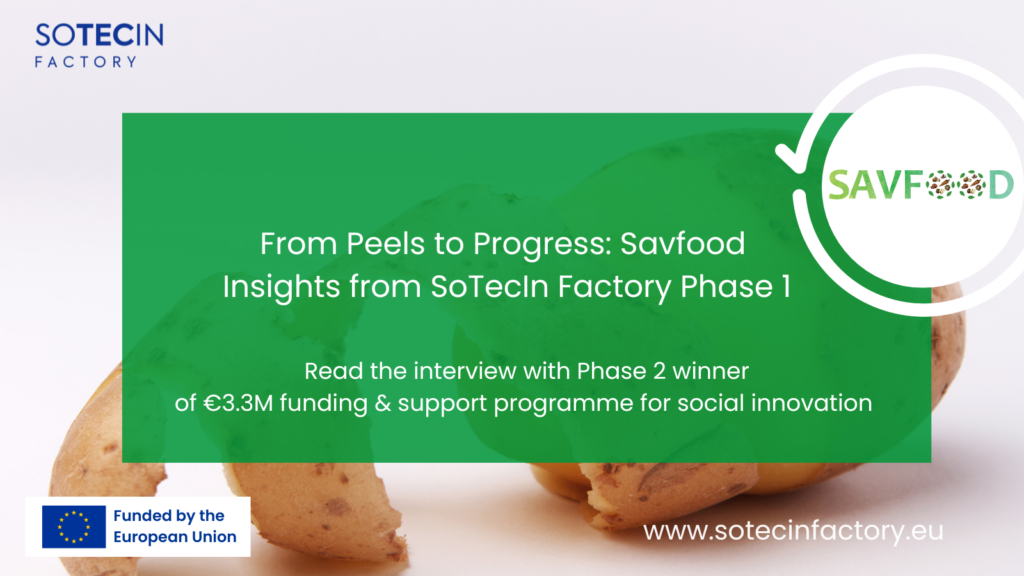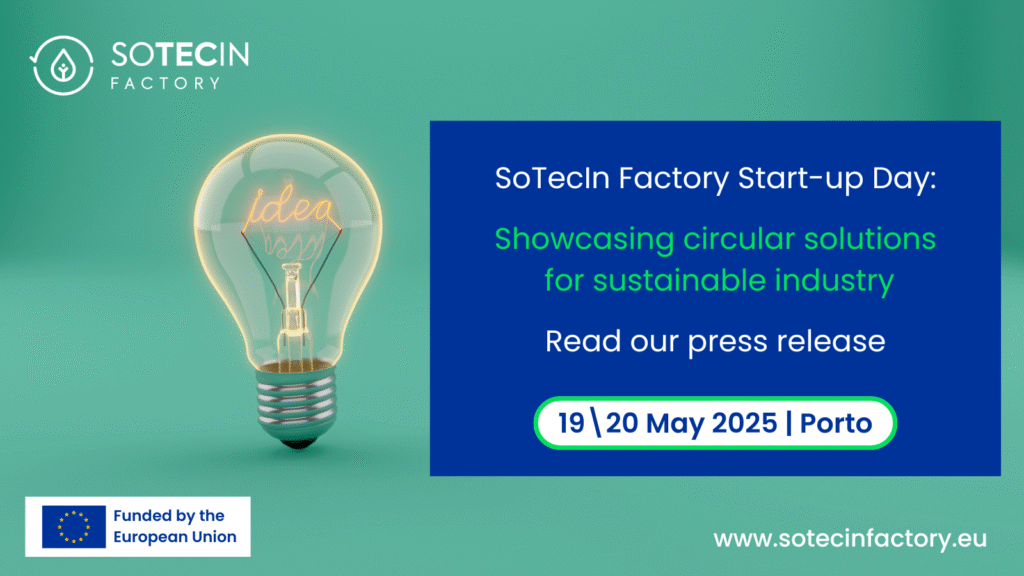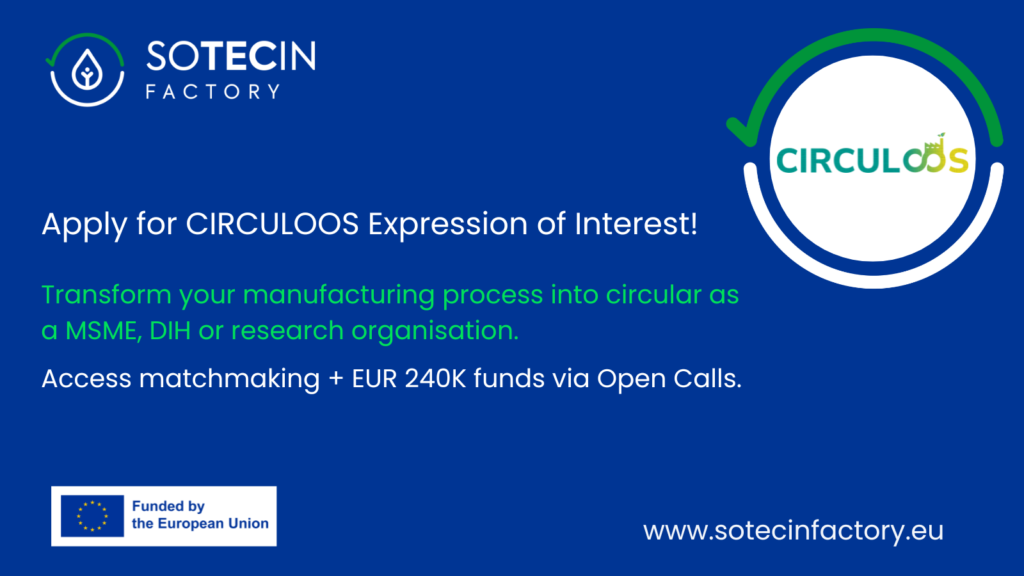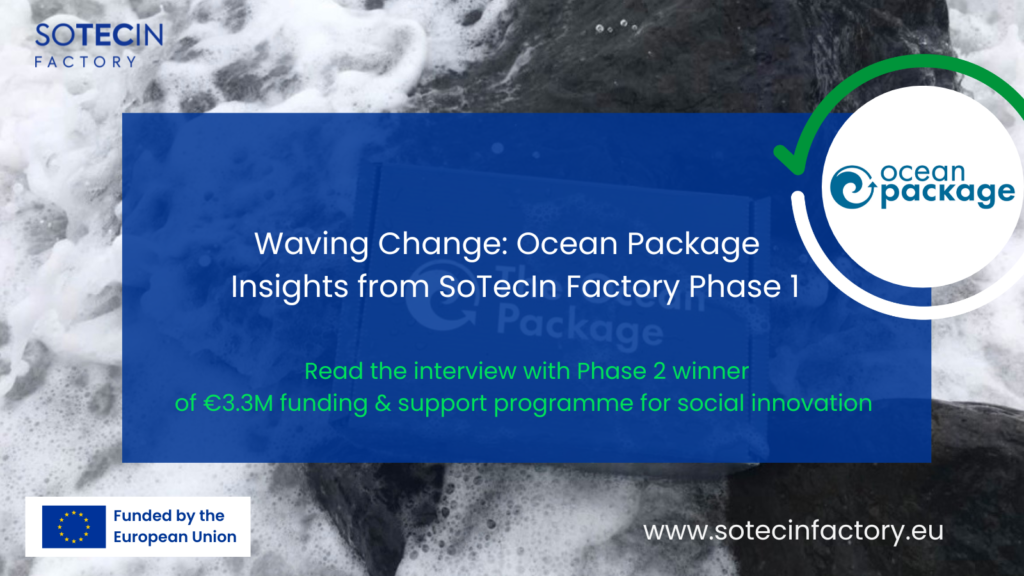Find out more about SavFood, their Phase 1 experience and mission for circular industry transformation, as one of SoTecIn Factory Open Call 1 Phase 2 winners receiving up to EUR 85K funding for the pre-market tech demonstration of their social innovation solution.
Can you briefly explain your solution and its key mission? What is your current business model?
Our solution focuses on converting potato peel waste into high-value food ingredients, promoting sustainability in the potato processing industry. This approach enables us to convert what is typically considered waste into high-value, allergen-free, nutritious ingredients that benefit both the potato processing industry and consumers. The key mission behind this solution is to reduce waste, lower CO2 emissions, and drive sustainability within the food production sector.
Our business model is built on **collaborative partnerships** with key players in the food processing sector, such as potato processors and technology providers to scale our waste valorization process. Through licensing, pilot projects, and distribution partnerships, we aim to integrate our sustainable ingredients into the food supply chain.
What long-term, systemic change do you aim to achieve in the industry? How has the SoTecIn Factory program, particularly Metabolic’s workshop on building systemic impact strategy, influenced your approach to triggering that change?
Our goal is to drive systemic change in the potato processing industry by integrating circular economy practises with a focus on waste valorisation. We aim to influence the entire sector, from small processors to larger industry players, promoting sustainability in both environmental and economic terms. Our strategy involves scaling our innovative waste-to-product solutions, advocating for supportive policies, and fostering a cultural shift in how the industry views waste and resource utilisation.
The SoTecIn Factory program, especially the workshop and mentorship from Metabolic, has been crucial in shaping our systemic impact strategy. It offered a structured approach to scaling solutions and influencing industry standards for circular economy practices. Our impact strategy centres on three pillars: **scaling out** by replicating our waste valorization processes, **scaling up** through policy advocacy, and **deepening impact by** fostering a cultural shift within the industry. We are proud of combining these approaches to create lasting, positive change for the environment and the sector.
In Phase 1, you joined workshops and mentoring to boost your capacity for systemic impact in the EU’s circular industry. What valuable skills, tools, or connections did you gain, and which parts were most helpful?
During Phase 1, the workshops and mentoring sessions were particularly valuable in enhancing our capacity to drive systemic impact across the EU, especially within the circular industry transition. The most helpful aspects included gaining practical tools for impact assessment, learning strategies for scaling circular practices, and deepening our knowledge of policy frameworks that support sustainable initiatives.
Connections made during the program, particularly with industry experts, helped shape our approach to engaging stakeholders and aligning with EU circular economy goals. The mentorship provided clarity on how to integrate systemic impact into our business model, ensuring long-term sustainability.
In your view, what support do social impact ventures with circular economy strategies need to be impactful and resilient? Has SoTecIn Factory Phase 1 provided any insights to improve your business sustainability?
Ventures focused on social impact and circular economy strategies need a blend of financial support, mentorship, policy alignment, and market development to drive resilience and impact.
**Access to capital** is essential for research, technology, and scaling, especially as these ventures require patient capital for long-term sustainability. **Mentorship and knowledge sharing** are also crucial, as expert guidance helps ventures navigate policies, refine business models, and expand networks; programs like SoTecIn Factory connect ventures with industry experts and offer structured mentorship. **Policy support and advocacy** plays a key role, with favourable regulations and incentives encouraging circular practices. **Strong partnerships** with industry players, research institutions, and NGOs are invaluable for sharing resources and expertise.
The SoTecIn Factory Phase 1 provided key insights into improving business sustainability by offering tools to better measure our impact and scale solutions effectively. The program emphasised the importance of building resilient partnerships and aligning with circular economy policies, which has helped refine our approach to growth and sustainability.
In Phase 1 of SoTecIn Factory, you co-developed your solution with a Market Validator, an industry actor and potential customer. How did this refine your solution and enhance your understanding of sustainable industry challenges? How will it prepare you for building and testing your Phase 2 demonstrator?
In Phase 1 of the SoTecIn Factory program, working with a Market Validator gave us invaluable insights into the real challenges and sustainability priorities of our target industry. Acting as a potential customer, the Market Validator provided direct feedback on our product’s feasibility, demand, and alignment with industry needs. This collaboration helped us refine our solution to be more market-ready, especially for waste valorisation and circular economy practices in potato processing. We gained a clearer view of operational pain points like supply chain complexities and resource inefficiencies, highlighting both the challenges and opportunities of adopting sustainable practices in our sector.
As we move into Phase 2, this foundational understanding sets the stage for the testing and demonstration phase. We’ll be equipped to pilot our solution in a way that addresses the real-world needs validated during Phase 1, making our demonstrator more impactful. By aligning our innovation more closely with industry needs, we increase the likelihood of adoption and scaling in the market.
What inspired you to adopt social initiatives in your business? Was there a specific moment or experience that sparked this decision?
The decision to adopt social initiatives in our business was driven by a combination of personal values and a recognition of the urgent need for sustainable practices within the food industry. The key moment came when we realized the impact of waste in the potato processing sector and the opportunity to turn it into something valuable. This experience sparked our commitment to circular economy principles, focusing on waste valorization and resource efficiency to create both social and environmental benefits.
How do you stay focused on your mission for a sustainable industry, and how has the SoTecIn Factory program supported you? Additionally, what were your key takeaways from the Phase 1 Steward Ownership workshop, and why is it an important governance approach for mission-driven businesses, even if you haven’t adopted it?
Staying focused on our mission for a sustainable industry requires aligning every business decision with our core values of circularity and resource efficiency. Regularly revisiting our goals, collaborating with like-minded partners, and tracking our impact metrics ensure we stay on course. The SoTecIn Factory program has been instrumental in this, providing not only mentorship but also frameworks to enhance our systemic impact strategy, especially through the guidance of experts like Metabolic.
During the Phase 1 Steward Ownership workshop, the key takeaway was the importance of governance models that prioritize the mission over profit. Although we haven’t adopted Steward Ownership directly, the principles of maintaining long-term mission alignment and protecting against mission drift are highly relevant. Steward Ownership ensures that businesses remain accountable to their social and environmental goals, rather than being swayed by short-term profit incentives. This approach fosters resilience and longevity for mission-driven businesses. Even if not implemented, it has shaped our thinking on how to safeguard our impact-driven objectives as we scale.
Balancing your mission with personal well-being can be challenging for social entrepreneurs. What’s your secret ingredient to achieving this balance? Are there any tips, tricks, or tools from the SoTecIn Factory Program—whether from webinars, mentorship, or informal chats—that you’d share with other innovators?
Balancing a mission-driven business with personal well-being is indeed a challenge. My key to maintaining this balance lies in setting clear boundaries, prioritizing self-care, and cultivating a strong support network. Regularly disconnecting from work to recharge and delegating tasks to trusted team members helps to manage stress and avoid burnout.
From the SoTecIn Factory Programme, one tool that really stood out was the emphasis on mindful leadership during informal coffee chats. The mentors highlighted the importance of taking time for reflection and self-awareness, which resonated deeply. Another helpful aspect was the focus on collaborative problem-solving, allowing us to lean on peers for support, which can reduce isolation and help balance personal well-being with business demands.
A simple tip from the programme is to create structured time blocks for both work and rest, ensuring there’s room for relaxation and reflection. Regularly reviewing your mission through this lens also helps to realign priorities, making sure you’re not sacrificing personal well-being in the name of progress.
For the end, what are your expectations of Phase 2 of the SoTecIn Factory programme? What are your general goals for the next 6-12 months?
For Phase 2 of the SoTecIn Factory programme, we expect to deepen collaborations, leverage new partnerships, and further scale our impact. Specifically, we aim to refine our business model and explore opportunities for commercialization, while focusing on strengthening our supply chain networks. The mentorship and strategic insights from this phase will be crucial in helping us navigate these challenges and drive systemic change.
Over the next 6-12 months, our primary goals are to: Expand market reach by securing more partnerships with food manufacturers and retailers; Pilot commercial trials to ensure the scalability of our sustainable solutions; Enhance operational efficiency, particularly in resource management and circular economy practices; Continue investing in innovation to improve our waste valorization technologies and processes.
These objectives will help us not only meet immediate business targets but also align with our long-term mission of fostering a more sustainable and circular industry.




